Iran 'Feigning Leniency' Toward Dissident, Says US Envoy
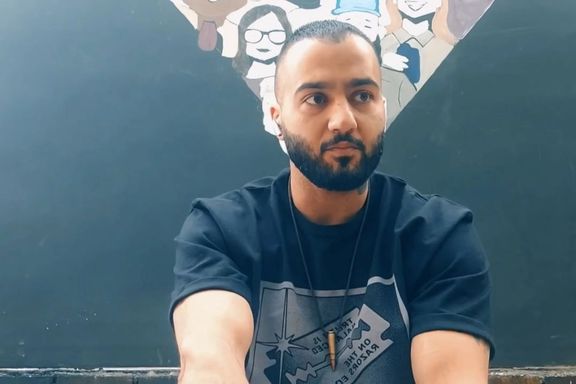
The US says the Iranian Judiciary's recent decision to overturn the death sentence of dissident rapper Toomaj Salehi was an attempt to "mislead the world by feigning leniency."

The US says the Iranian Judiciary's recent decision to overturn the death sentence of dissident rapper Toomaj Salehi was an attempt to "mislead the world by feigning leniency."
The Biden administration's acting special envoy for Iran, Abram Paley, said the cases against Toomaj Salehi and Nobel Peace Prize laureate Narges Mohammadi "are perfect examples" of how the Islamic Republic "wields its judicial system to silence dissent."
"Their purported crime? Speaking out against the regime's abuses. And now in the case of Toomaj, the regime misleads the world by feigning leniency," he said of the pair who have become faces of the uprising.
The US envoy called on the Islamic Republic to "release Toomaj, Narges, and every political prisoner now."
Thousands of Iranians have been rounded up since the 2022 Woman, Life, Freedom uprising began in the wake of the murder of Mahsa Amini in morality police custody.
Over 550 protesters were killed in the uprising which has posed the greatest challenge to the regime since the founding of the Islamic Republic.
Dissident rapper Salehi was sentenced to death by a revolutionary court in Esfahan in April this year on charges of "spreading corruption on Earth."
However, his lawyer announced on Saturday the overturning of Toomaj's death sentence, saying “the Supreme Court avoided an irreparable judicial error".
Initially sentenced to six years and three months in July 2023, Salehi was granted bail on November 18, 2023. However, less than two weeks later, the 32-year-old dissident rapper was re-arrested on new charges of "publishing falsehoods" after releasing a video detailing his torture experiences in custody, as reported by Raisian.
He is among dozens of celebrities and public personalities to have been targeted by the regime, with punishments including travel bans, bank account freezes, work bans and imprisonment.
Iran is amid a record wave of executions in a bid to quash dissent, last year alone executing 853 according to Amnesty International, numbers supported by the United Nations.
Overturning Salehi's death sentence also coincided with the snap presidential elections in Iran that will take place on Friday as at least two thirds of Iranians will boycott the upcoming polls.
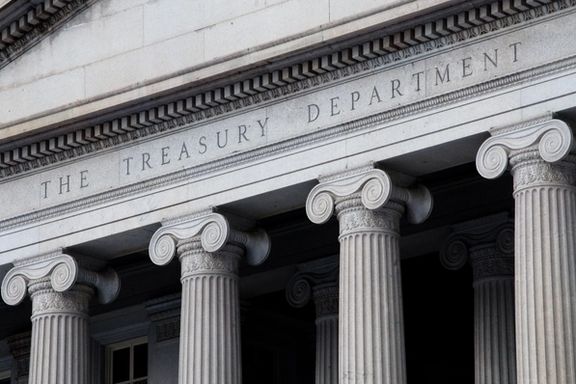
The US Treasury on Tuesday imposed fresh sanctions against a vast "shadow banking" system used by Iran’s military to launder billions of dollars of oil proceeds and other illicit revenue.
In a statement on its website, the US Treasury said it is sanctioning "nearly 50 entities and individuals that constitute multiple branches of a sprawling 'shadow banking' network used by Iran’s Ministry of Defense and Armed Forces Logistics (MODAFL) and IRGC to gain illicit access to the international financial system and process the equivalent of billions of dollars since 2020."
"MODAFL and the IRGC engage in several commercial revenue-generating activities, most notably the sale of Iranian oil and petrochemicals," it added.
According to the statement, "networks of Iranian exchange houses and dozens of foreign cover companies under their control enable MODAFL and the IRGC to disguise the revenue they generate abroad that is then available to use for a range of MODAFL and IRGC activities, including the procurement and development of advanced weapons systems such as unmanned aerial vehicles."
The US Treasury says the revenue made through this network "also supports the provision of weapons and funding to Iran’s regional proxy groups, including Yemen’s Houthis, who continue a campaign of reckless attacks on global shipping, as well as the transfer of UAVs to Russia for use in its war of aggression against Ukraine."
Deputy Secretary of the Treasury Wally Adeyemo said the US is taking action against "a vast shadow banking system used by Iran’s military to launder billions of dollars of oil proceeds and other illicit revenue."
“We have sanctioned hundreds of targets involved in Iran’s illicit oil and petrochemical-related activity since President Biden took office, and we will continue to pursue those who seek to finance Iran’s destabilizing terrorist activities. We continue to work with allies and partners, as well as the global financial industry, to increase vigilance against the movement of funds supporting terrorism," Adeyemo said.
Iran's Defense Ministry "is responsible for development, production, funding, and logistics for all of Iran’s defense industries," according to the US Treasury. "Iran’s budget allots billions of dollars’ worth of Iranian oil to the Iranian armed forces to sell abroad in order to supplement their budgets."
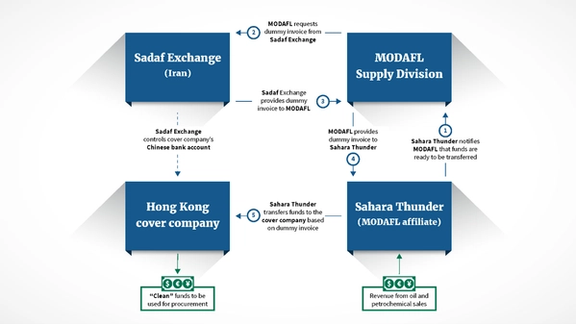
On top of the list of sanctions is Iranian-Turkish money-changer Seyyed Mohammad Mosanna’i Najibi who, through his Iranian branch of business Sadaf Exchange, "has managed several currency exchange businesses in Iran and Türkiye in coordination with the MODAFL Supply Division for the purpose of bypassing US and European sanctions on Iran," the Treasury said.
Omid Sepah Exchange Company and Hekmat Iranian Exchange & Foreign Currency Services Company, and Iranian money-changers Asadollah Seifi, Ramin Jalalian, Reza Mir Mohammad Ali and Siavash Nourian are among other key individuals and entities sanctioned by the US Treasury on Tuesday.
The Treasury's OFAC says it has also designated 27 cover companies based in Hong Kong, the United Arab Emirates (UAE), and the Marshall Islands that are controlled by Najibi and used to obfuscate the MODAFL Supply Division’s international financial activity.
Iran's IRGC has utilized foreign currency exchange offices in Türkiye and Iraq as well as Hong Kong, among other countries, to circumvent US sanctions and fund its regional proxies.
Last year, the United States set a reward of up to $15 million for receiving information on the illicit financial network of Iran's Revolutionary Guard (IRGC).
"The IRGC uses numerous financial mechanisms to fund its activities, including front companies and other entities that help it bypass US and international sanctions," the US State Department said last year.
The Biden administration has already issued dozens of sanction designations on companies and individuals affiliated with the Revolutionary Guard in several countries.
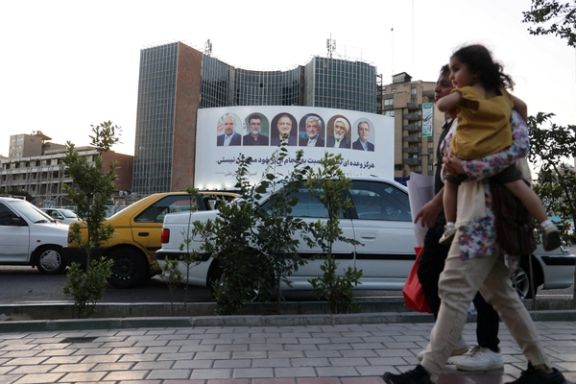
Whether it is a football championship or a presidential election in Iran, the outcome is always uncertain. There are many ifs and buts, with analysts, pundits, and spin doctors further complicating the scene.
In the absence of accurate and unbiased polls and surveys, predicting what might happen—even in the short term—is always challenging. This lack of reliable data makes it difficult for anyone to have a clear understanding of imminent events.
A few days before the voting day in Iran's snap presidential election, it remains uncertain who will stay in the race. Four of the six candidates—Majles Speaker Mohammad Bagher Ghalibaf, Tehran Mayor Alireza Zakani, former nuclear negotiator Saeed Jalili, and Martyrs Foundation Chief Amir Hossein Ghazizadeh Hashemi—are from the same camp. If they all remain in the competition, no one in the conservative camp is likely to win.
None of them is meaningfully more popular than others in the same camp, although Ghalibaf and Jalili are the two forerunners. The other two are so sure about their unpopularity that they do not do any campaigning, other than the free campaigning the state television offers all candidates.
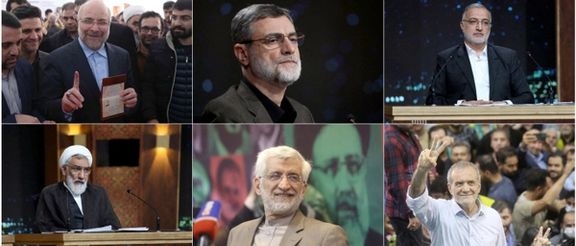
Although none of the polls and surveys can be fully trusted at this time, all available figures—both genuine and fabricated—indicate that turnout will significantly impact the candidates' standings. Most suggest that a lower turnout increases the likelihood of a conservative victory, while a high turnout would favor the pro-reform candidate, Massoud Pezeshkian.
A turnout under 40 percent gives Jalili a strong chance of winning, potentially even in the first round. A 50 percent turnout puts Ghalibaf, a slightly less hardline candidate, in a better position. A 60 percent turnout would likely ensure Pezeshkian's victory in the first round, eliminating the need for a runoff election.
The reason is that over 60% of voters have shunned the ballot box in the last two elections due to deep disillusionment. The more this disillusioned majority votes, the more support relative moderates are likely to receive.
However, despite all the fuss about a consolidated conservative camp, they are badly divided. Their combination in the election, shows that it is every man for himself. Some journalists say there will be a conservative figureheads' gathering on Tuesday or Wednesday and three of the conservative candidates will withdraw in the interest of the more popular individual. No one yet knows for sure whether Jalili or Ghalibaf will remain in the race.
From the perspective of Supreme Leader Ali Khamenei, Ghalibaf is the preferable choice because, unlike Jalili, he lacks an ideological agenda and political party affiliation. Jalili's domestic and alleged foreign connections make him a suspect in Khamenei's eyes, as he leaves no room for doubts regarding his men's loyalty.
During the past days, while mudslinging against Ghalibaf has been diminishing, videos surfaced on social media in which former presidents Ebrahim Raisi and Hassan Rouhani showed Jalili in a bad light. Raisi said in his video that he offered many jobs to Jalili but he did not accept any one of them. These comments are extremely damaging as Raisi' is being treated like a saint following his death.
Rouhani on the other hand said that all members of the Supreme Council of National Security endorsed Former Foreign Minister Javad Zarif's way out of the diplomatic impasse over Iran's nuclear deal with big powers, but Jalili obstructed the plan and the negotiations failed.
The two videos could have not surfaced in a worse time. Many social media figures believe that they ruined Jalili's chances and brought Ghalibaf to a position to be one of the main two contestants in the upcoming election.
Current estimates of a low turnout might prove wrong. As Qom Seminarian Mohammad Taqi Akbarzadeh has noted, if officials misinterpret the people's votes as wholehearted support for government policies and fail to implement necessary changes, the public is likely to express their opposition through street protests and rebellion.

Iran's judiciary has warned citizens that using foreign messaging platforms by candidates and their supporters during elections constitutes a severe electoral offense punishable by law.
The Social Affairs and Crime Prevention Department of the Judiciary emphasized the gravity of this offense, particularly during the campaign silence period (24 hours preceding elections).
State-run IRNA news reported Tuesday that “The Judiciary has forged alliances with three telecommunications operators to heighten public awareness and advocate responsible technology usage, aimed at mitigating criminal activities.”
It further noted, “For the past three years, citizens have received cautionary text messages as part of an initiative to bolster awareness regarding their societal rights.”
Over the last twenty years, Iran has enacted comprehensive censorship policies, blocking tens of thousands of websites. The advent of social media and messaging apps has further restricted platforms such as Facebook, YouTube, Viber, WeChat, Telegram, and Twitter. Traditional media, literature, and cinema also face rigorous scrutiny, which is assessed against Islamic principles and political content.
To navigate around these online constraints and evade filters, individuals often resort to Virtual Private Networks (VPNs) to gain unimpeded access to the Internet. While in more liberal societies, VPNs are primarily used to protect user anonymity, in Iran, they serve as crucial tools for accessing unrestricted information.

The security officer who fatally shot 19-year-old protester Sepehr Beiranvand in 2022, has been acquitted of the murder charge.
"The plain clothes officer who fatally shot this teenager in the neck before bystanders was acquitted of the charge of intentional homicide by the central province court after one year and eight months," a person close to Beiranvand's family told Iran International.
According to this source, in June 2023, the officer was formally accused of deliberate homicide in an indictment issued by the Lorestan Military Court.
He added, "Following the case referral to the Supreme Court for confirmation of the punishment, the judges ordered a reexamination of the evidence by experts familiar with the case."
Beiranvand was writing slogans on a street in Khorramabad, in western Iran, when plainclothes officers noticed him. He attempted to escape by climbing a municipal gas pipe, but he was shot in the neck and died as a result.
According to the source, after Biranvand's death, the government insisted on holding a funeral without any relatives present before releasing his body. They also demanded money from his family to send experts to investigate the case. Witnesses to Beiranvand's killing emphasized that he was unarmed and just writing slogans when he was identified and shot.
The nationwide protests of 2022, known as the Woman Life Freedom movement, were sparked by the death of 22-year-old Mahsa Amini while in the custody of the morality police. The protests resulted in the deaths of over 550 protesters, including minors.
After a thorough investigation spanning 18 months, a UN fact-finding mission in March issued its report, determining that the Iranian government bears responsibility for the "physical violence" leading to the death of Amini.
According to the report, the regime perpetrated extensive and persistent human rights violations that contravened international laws, disproportionately affecting women, girls, children, and members of ethnic and religious minorities during the protests.

The Australian Iranian Community Alliance (AICA) has called on the Australian government to designate the Islamic Revolutionary Guard Corps (IRGC) as a terrorist organization.
The appeal, addressed to Prime Minister Anthony Albanese, Foreign Minister Penny Wong, and Attorney General Mark Dreyfus, was published on Tuesday, in the wake of Canada's recent designation.
AICA, which consists of 26 organizations and groups in Australia, made the call in response to a letter from the Australia-Iran Friendship Association that protested Canada's designation of the IRGC as a terrorist organization.
The AICA said the group is a supporter of the IRGC and the Islamic Republic and urged the Australian government to recognize the true nature of the IRGC and align with international allies to take a firm stance against activities that threaten global security.
The US designated the IRGC in 2019 and last year, the UK said Iran was among the country's number one foreign threats, though has not yet designated the group, in spite of calls from lawmakers.
In their letter of appeal, the AICA stated, "We write to express deep concerns regarding assertions recently made in an open letter that argues against the designation of the Islamic Revolutionary Guard Corps (IRGC) as a terrorist organization. This letter underplays the documented history and ongoing actions of the IRGC that unequivocally undermine global peace and security."
Dozens of plots against Iranian dissidents and Jewish and Israeli targets have been unveiled in the last two years, hatched by the IRGC, in countries spanning the globe.
AICA highlighted the IRGC's involvement in international terrorism, including bombings, rocket attacks on bases in Iraq, and the downing of civilian airliner PS752. They criticized the claim that the designation would serve foreign agendas, noting that many countries, including the European Union and the United States, have recognized parts or all of the IRGC as a terrorist entity.
Individuals such as dissident journalist Mahsi Alinejad and members of Iran International's news team have also been targets of plots to kill and abduct Iranians abroad.
The letter also condemned the friendship group's suggestion that such a designation would impact votes within Muslim constituencies in Australia, describing it as a manipulative tactic resembling hostage diplomacy.
The AICA asserted that Australian policy should be guided by facts and a commitment to national and international security, rather than speculative electoral implications.
The Australian Department of Foreign Affairs on Friday told Iran International that the current framework within Australia's Criminal Code does not allow for the listing of the IRGC as a terrorist organization. Several states claim that as a state body, designation is legally fraught.
However, they noted that the government has imposed targeted financial sanctions on more than 80 IRGC-linked individuals and entities since Iran's violent suppression of protests in September 2022.